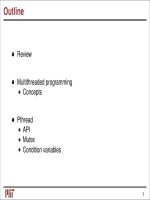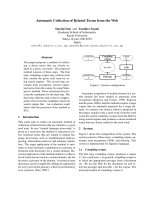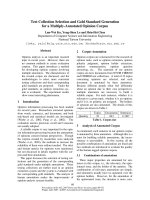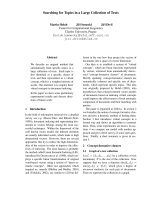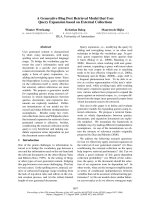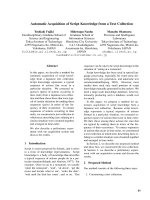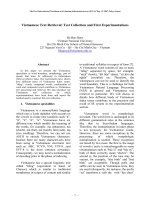Garbage collection
Bạn đang xem bản rút gọn của tài liệu. Xem và tải ngay bản đầy đủ của tài liệu tại đây (204.59 KB, 30 trang )
Outline
Review
Multithreaded programming
Concepts
Pthread
API
Mutex
Condition variables
1
6.087 Lecture 12 – January 27, 2010
Review
Multithreaded programming
Concepts
Pthread
API
Mutex
Condition variables
2
Review: malloc()
•
Mapping memory: mmap(), munmap(). Useful for
demand paging.
•
Resizing heap: sbrk()
•
Designing malloc()
•
implicit linked list,explicit linked list
•
best fit,first fit,next fit
Problems:
•
•
fragmentation
•
memory leaks
•
valgrind –tool=memcheck, checks for memory leaks.
2
Garbage collection
•
C does not have any garbage collectors
•
Implementations available
•
Types:
•
Mark and sweep garbage collector (depth first search)
•
Cheney’s algorithm (breadth first search)
•
Copying garbage collector
3
6.087 Lecture 12 – January 27, 2010
Review
Multithreaded programming
Concepts
Pthread
API
Mutex
Condition variables
4
Preliminaries: Parallel computing
•
Parallelism: Multiple computations are done
simultaneously.
•
Instruction level (pipelining)
•
Data parallelism (SIMD)
•
Task parallelism (embarrassingly parallel)
•
Concurrency: Multiple computations that may be done in
parallel.
•
Concurrency vs. Parallelism
4
Process vs. Threads
•
Process: An instance of a program that is being executed
in its own address space. In POSIX systems, each
process maintains its own heap, stack, registers, file
descriptors etc.
Communication:
•
Shared memory
Network
•
•
Pipes, Queues
•
Thread: A light weight process that shares its address
space with others.In POSIX systems, each thread
maintains the bare essentials: registers, stack, signals.
Communication:
•
shared address space.
5
Multithreaded concurrency
Serial execution:
•
All our programs so far has had a single thread of
execution: main thread.
•
Program exits when the main thread exits.
Multithreaded:
•
Program is organized as multiple and concurrent threads
of execution.
•
The main thread spawns multiple threads.
•
The thread may communicate with one another.
•
Advantages:
•
Improves performance
•
Improves responsiveness
•
Improves utilization
•
less overhead compared to multiple processes
6
Multithreaded programming
Even in C, multithread programming may be accomplished in
several ways
•
Pthreads: POSIX C library.
•
OpenMP
•
Intel threading building blocks
•
Cilk (from CSAIL!)
•
Grand central despatch
•
CUDA (GPU)
•
OpenCL (GPU/CPU)
7
Not all code can be made parallel
f l o a t params [ 1 0 ] ;
f o r ( i n t i =0 ; i <10; i ++)
do_something ( params [ i ] ) ;
f l o a t params [ 1 0 ] ;
f l o a t prev =0;
fo r ( i n t i =0 ; i <10; i ++)
{
prev=co mpl i cat e d ( params [ i ] , prev ) ;
}
paralleizable not parallelizable
8
Not all multi-threaded code is safe
i n t bal ance =500;
void d e p o s i t ( i n t sum ) {
i n t c u r r bala n c e = bal ance ; / ∗ read bala nce ∗/
. . .
cur r b a l a n ce +=sum ;
bal ance=cu r r b a l ance ; / ∗ w r i t e b alanc e ∗/
}
void wit hdraw ( i n t sum ) {
i n t c u r r bala n c e = bal ance ; / ∗ read bala nce ∗/
i f ( cur r ba l anc e >0)
cu r rba l anc e −=sum ;
bal ance=cu r r b a l ance ; / ∗ w r i t e balanc e ∗/
}
. .
d e p o s i t ( 1 0 0 ) ; /
∗ thr e a d 1 ∗ /
. .
wi th dr aw ( 5 0 ) ; / t h r ead 2
∗/
. .
wi th dr aw ( 1 0 0 ) ; /
∗ thr e a d 3 ∗ /
. . .
•
minimize use of global/static memory
•
Scenario: T1(read),T2(read,write),T1(write) ,balance=600
•
Scenario: T2(read),T1(read,write),T2(write) ,balance=450
9
6.087 Lecture 12 – January 27, 2010
Review
Multithreaded programming
Concepts
Pthread
API
Mutex
Condition variables
10
